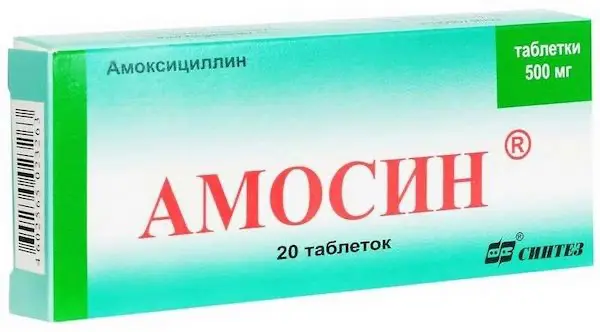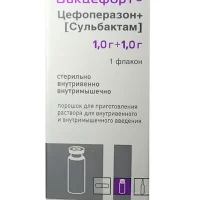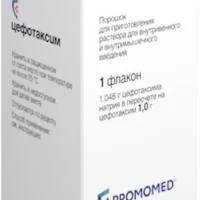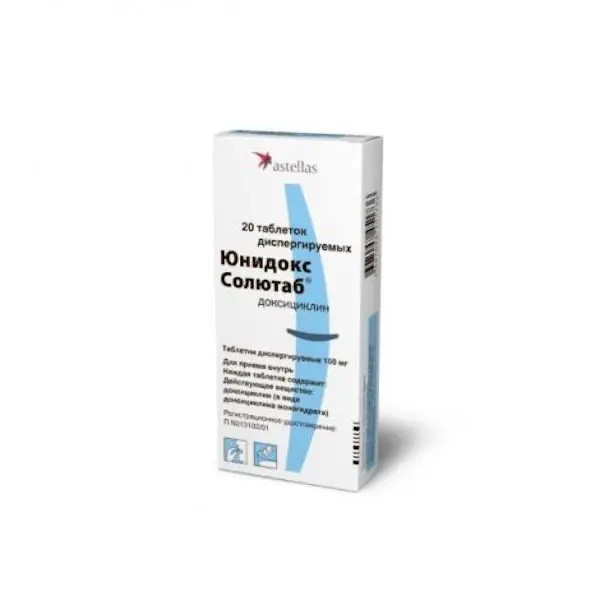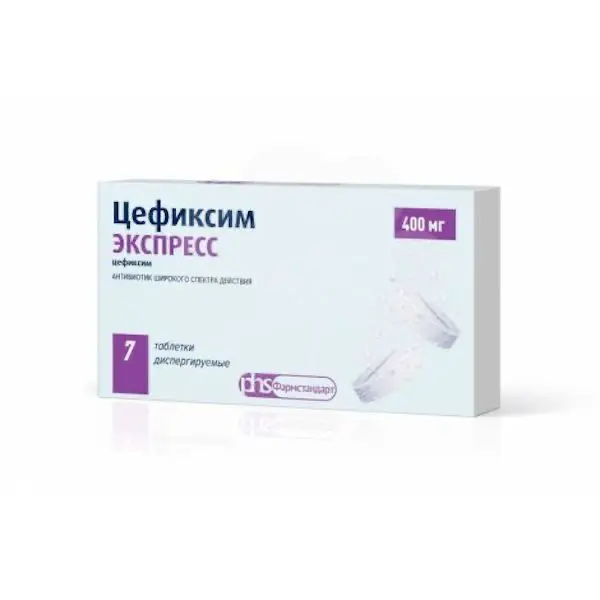Description
Amosin Pharmacodynamics
It is a broad-spectrum antibiotic of the group of semisynthetic penicillins. It has a bactericidal effect. Inhibits transpeptidase, disrupts synthesis of peptidoglycan (support polymer of cell wall) during division and growth, causes lysis of bacteria. It is acid resistant.
Active against aerobic gram-positive bacteria: Staphylococcus spp. (except for strains producing penicillinase), Streptococcus spp.; aerobic gram-negative bacteria: Neisseria gonorrhoeae, Neisseria meningitidis, Bacillus anthracis, Listeria monocytogenes, Helicobacter pylori, Klebsiella spp.
Microorganisms producing penicillinase are resistant to the action of amoxicillin.
Action develops 15-30 min after administration and lasts for 8 hours.
Indications
Infectious and inflammatory diseases caused by microorganisms sensitive to the drug:
– Respiratory organ infections (including bronchitis, pneumonia);
– ENT-organ infections (including sinusitis, pharyngitis, tonsillitis, acute otitis media);
– Infections of the urogenital system (including pyelonephritis, pyelitis, cystitis, urethritis, gonorrhea);
– Gynecological infections (including endometritis, cervicitis);
– Gastrointestinal infections (including peritonitis, enterocolitis, typhoid, cholangitis, cholecystitis);
– Skin and soft tissue infections (including rye, impetigo, secondary infected dermatoses);
– leptospirosis;
– listeriosis;
– Lyme disease (borreliosis);
– dysentery;
– Salmonellosis, salmonellosis carrier;
– meningitis;
– endocarditis (prophylaxis);
– sepsis.
Infectious and inflammatory diseases caused by microorganisms sensitive to the drug:
– Respiratory organ infections (including bronchitis, pneumonia);
– ENT-organ infections (including sinusitis, pharyngitis, tonsillitis, acute otitis media);
– Infections of the urogenital system (including pyelonephritis, pyelitis, cystitis, urethritis, gonorrhea);
– Gynecological infections (including endometritis, cervicitis);
– Gastrointestinal infections (including peritonitis, enterocolitis, typhoid, cholangitis, cholecystitis);
– Skin and soft tissue infections (including rye, impetigo, secondary infected dermatoses);
– leptospirosis;
– listeriosis;
– Lyme disease (borreliosis);
– dysentery;
– Salmonellosis, salmonellosis carrier;
– meningitis;
– endocarditis (prophylaxis);
– sepsis.
Contraindications
– allergic diathesis;
– bronchial asthma, pollinosis;
– infectious mononucleosis;
– lympholeukemia;
– liver failure;
– history of gastrointestinal diseases (especially colitis associated with the use of antibiotics);
– lactation period (breast-feeding);
– Hypersensitivity to the components of the drug;
– hypersensitivity to other penicillins, cephalosporins, carbapenems);
– children under 3 years of age (for tablets and capsules).
The drug should be used with caution if it is prescribed during pregnancy, renal failure or if there is a history of bleeding.
– allergic diathesis;
– bronchial asthma, pollinosis;
– infectious mononucleosis;
– lympholeukemia;
– liver failure;
– history of gastrointestinal diseases (especially colitis associated with the use of antibiotics);
– lactation period (breast-feeding);
– Hypersensitivity to the components of the drug;
– hypersensitivity to other penicillins, cephalosporins, carbapenems);
– children under 3 years of age (for tablets and capsules).
The drug should be used with caution if it is prescribed during pregnancy, renal failure or if there is a history of bleeding.
Dosage and administration method
- The drug is taken orally, before or after meals. Dosing regimen is set individually, taking into account the severity of the disease, the sensitivity of the pathogen to the drug and the patient’s age.
- For adults and children over 10 years old (with body mass > 40 kg) it is prescribed in dose 500 mg 3, in severe course of disease – 0.75-1 g 3
In children aged 5 to 10 years, 250 mg 3, in children aged 2 to 5 years – 125 mg 3, in children under 2 years – 20 mg/kg/ in 3 doses. The course of treatment is 5-12 days. Children under 5 years of age are prescribed the drug in the form of suspension. - For treatment of acute uncomplicated gonorrhea the drug is prescribed in a dose of 3 g once; during treatment of women it is recommended to take the same dose repeatedly.
In acute infectious diseases of the gastrointestinal tract (paratyphoid, typhoid) and biliary tract, in gynecological infectious diseases adults are prescribed 1.5-2 g 3 or 1-1.5 g 4
In leptospirosis adults are prescribed 500-750 mg 4 for 6-12 days. - In case of Salmonella carriage adults are prescribed 1.5-2 g 3 for 2-4 weeks.
For prophylaxis of endocarditis during minor surgical interventions in adults it is prescribed in dose 3-4 g 1 hour before procedure. If necessary a second dose is administered after 8-9 hours. In children the dose is halved.

